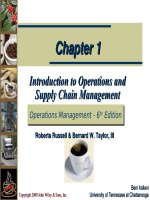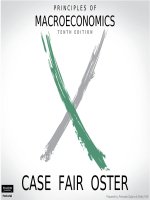Management by hitt back porter CH01
Bạn đang xem bản rút gọn của tài liệu. Xem và tải ngay bản đầy đủ của tài liệu tại đây (561.44 KB, 29 trang )
Chapter 1
Introduction
PowerPoint slides by
R. Dennis Middlemist
Colorado State University
Learning Objectives
After studying this chapter, you should be
able to:
2
Answer the question: What is
management?
Explain why management must be
understood within the context of
organizations and how organizations affect
the practice of management.
©2005
Learning Objectives
After studying this chapter, you should be
able to:
3
Describe the role of working with and
through people in effective management.
Explain managerial paradoxes and how
dealing with them lies at the core of
management.
Specify the nature and extent of commitment
required for managerial excellence.
©2005
Learning Objectives
After studying this chapter, you should be
able to:
4
Define the term “entrepreneurial mindset”
and explain its importance for managers.
Describe and compare the different
elements of managerial work and the
different managerial roles.
Discuss the skills necessary to be an
effective manager.
©2005
Y
G
LO
NO
CH
TE
G
LO
B
AL
IS
M
Managing Effectively: Three
Critical Challenges
Management Challenges
for the 21st Century
CHANGE
5
©2005
Adapted from Exhibit 1-1: Critical Management Challenges for the 21st Century
Managing Strategically to
Meet the Challenges
Importance of knowledge and intellectual
capital
Change requires managers to
Manage within an organizational context
Accomplish tasks with and through people
Manage paradoxes
Make a substantial commitment and manage
in an entrepreneurial manner
6
©2005
What is Management?
It is a process
A series of activities and operations, such as planning,
deciding, and evaluating
Of assembling and using sets of resources
Human, financial, material and information
In a goal‑directed manner to accomplish tasks
A purposeful activity
In an organizational setting
It is undertaken in organizations
By people with different functions intentionally structured
and coordinated to achieve common purposes
7
©2005
Management Perspective 1:
The Organizational Context
Management occurs in organizations, not in
isolation
There are many different types of organizations
Each organization has its own characteristics
that influence effective management
Effective managers must understand
organizations
8
©2005
Management Perspective 2:
The Human Factor
Effective managers must
be adept at
Assessing other people’s
capabilities
Matching people’s
capabilities with
appropriate responsibilities
Motivating people
9
©2005
Management Perspective 3:
Managing Paradoxes
Management requires simultaneously
mastering multiple and potentially conflicting
situations
Integration and fragmentation
Consistency & Flexibility
Reflection & Action
Global Perspective and
Local Understanding
10
©2005
Management Perspective 4:
Entrepreneurial Mindset
Managers must continuously search for
and exploit new opportunities
An entrepreneurial mindset requires a
commitment to constantly learning new
skills and acquiring new knowledge
An entrepreneurial mindset also requires
a commitment to adding value to other
people’s efforts and to society
11
©2005
What Managers Do
Managerial activities differ by
The functions managers serve
The roles in which managers
operate
The dimensions of each
manager’s job
12
©2005
Managerial Functions
Managing
Organizing
Controlling
Planning
Directing
13
©2005
Adapted from Exhibit 1.2: Managerial Functions
Planning
Planning involves
Estimating future conditions and
circumstances
Making decisions based on these
estimations about what work is to be done
By
the manager
By all of those for whom she or he is responsible
14
©2005
Organizing
Organizing involves paying attention to
The structure of relationships among
positions
The people occupying those positions
Linking that structure to the overall strategic
direction of the organization
15
©2005
Directing (Leading)
Directing is the process of influencing
other people to attain organizational
objectives
Motivating others
Interacting effectively in group and team
situations
Communicating in support of others’ efforts
on behalf of achieving their work and
organizational goals
16
©2005
Controlling
Regulating the work of those for whom a
manager is responsible which may include
Setting standards of performance in advance
Monitoring ongoing (real‑time) performance
Assessing a completed performance
Results of the control process (evaluation)
are fed back into the planning process
17
©2005
Managerial Roles
Interpersonal Roles
Figurehead
Leader
Liaison
Informational Roles
Monitor
Disseminator
Spokesperson
Decisional Roles
Entrepreneurial
18
©2005
Disturbance Handler
Resource Allocator
Negotiator
Adapted from Exhibit 1.3: Types of Managerial Roles
Managerial Job Dimensions
Demands
19
©2005
Activities or duties that
must be carried out
Standards or levels of
minimum performance
that must be met.
Managerial Job Dimensions
Demands
Constraints
Factors that limit the
response of the
manager
Time
Budgets
Technology
Attitudes of subordinates
Legal regulations
20
©2005
Managerial Job Dimensions
Demands
Discretionary behavior
How work is to be done
Constraints
Choices
21
©2005
How much work is to be
done
Who will do the work
What initiatives will be
undertaken from almost
infinite possibilities
Two Managerial Jobs
Demands
22
©2005
Job A: Project
Team Manager
Job B: Fast Foods
Restaurant Manager
Develop new product
Maintain attractive
with strong market
appeal
Hold formal weekly
progress meeting with
boss
Frequent travel to
other company sites
appearance of
restaurant
Keep employee costs
as low as possible
Meet standards for
speed of service
Adapted from Exhibit 1.4: Two Managerial Jobs with Different Demands, Constraints and Choices
Two Managerial Jobs
Constraints
23
©2005
Job A: Project
Team Manager
Job B: Fast Foods
Restaurant Manager
12 month deadline for
Most employees have
product development
Project budget limit of
$1 million
No choice in selecting
team members
limited formal education
Few monetary
incentives to reward
outstanding
performance
Federal and state
health and safety
regulations
Adapted from Exhibit 1.4: Two Managerial Jobs with Different Demands, Constraints and Choices
Two Managerial Jobs
Choices
24
©2005
Job A: Project
Team Manager
Job B: Fast Foods
Restaurant Manager
The organizational
Selection of employee
structure of the project
to promote to
team
supervisor
Sequencing of project Scheduling of shifts and
tasks
assignments
Budget allocation
Local advertising
promotions
Adapted from Exhibit 1.4: Two Managerial Jobs with Different Demands, Constraints and Choices
What Skills Do Managers
Need?
Interpersonal skills
Sensitivity
Persuasiveness
Empathy
Technical skills
Specialized knowledge
(Including when and
how to use the skills)
25
©2005
Conceptual skills
Logical reasoning
Judgment
Analytical abilities
Adapted from Exhibit 1.5: Managers’ Skills









